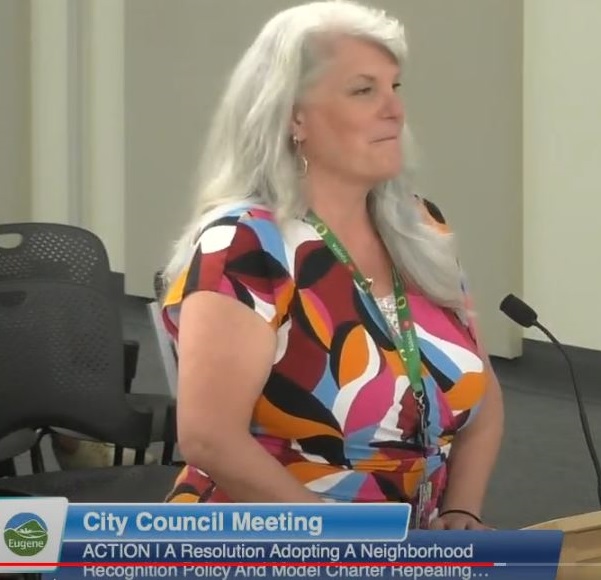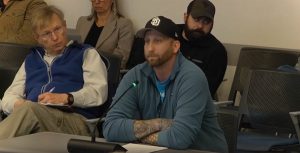New city policy hopes to keep more neighborhood associations active
6 min read
Eugene’s City Council adopts a new ‘constitution’ for neighborhood associations. The Neighborhood Organization Recognition Policy (the NORP), gets unanimous approval May 13. It’s meant to provide active neighborhood associations to all city residents. The project launched just over two and a half years ago. At the Neighborhood Leaders Council Oct. 26, 2021:
[00:00:23] Robert Brack (HRNI, to the NLC Oct. 26, 2021): Hello everyone. I’m Robert Brack with the Human Rights and Neighborhood Involvement office.
[00:00:27] There’s some community interest in the West Eugene Community Organization to reactivate. And so I’ll be meeting with some community volunteers in that area to discuss what activation could look like and what support they may need. Those neighbors aren’t getting a chance to participate in a lot of the same processes that we all do.
[00:00:47] Our office is starting to look at that a little bit more: How are we working to help support all of the neighborhood associations and that history of associations having a surge of activity and then that falling off again and people not continuing to help their neighborhoods be involved in their association work.
[00:01:09] And so we’ll be looking at that and we might even reach out to some neighborhood associations just to have you all interacting and helping to support some of those other communities.
[00:01:24] Robert Brack (HRNI, to the NLC Jan. 25, 2022): There’s 9,000 resident addresses that are currently not represented by a neighborhood association.
[00:01:32] And I think I’ve brought it up at an NLC meeting before too, and that’s the ‘Neighborhood Boundary Project’ that HRNI staff is moving forward with. And so what this project is about is reviewing the NORP and also giving the opportunity for neighborhoods to look at their boundaries in relation to what some of the policies and procedures are around the NORP.
[00:01:57] And again, HRNI, we don’t have any, like, endgame, and I have no idea where this work is going to go. And it’s really kind of just starting that process of: How do we help support these residents that just don’t have the same amount of access? And see if we can figure that out as a group, as other neighborhood leaders.
[00:02:15] John Q: That work was paused as the neighborhood office, renamed to take on a bigger role in equity and community engagement, hired new staff members, and adopted priority-based budgeting.
[00:02:28] Dennis Hebert (Southeast Neighbors, at NLC Sept. 26, 2023): I have a question for Fabio. Last spring we were talking about this new city process giving neighborhood associations more leeway on changing their bylaws. That was going to be approved in a few weeks and it kept on being a few weeks, a few weeks. Well, it’s now the fall. And I’m wondering, where are we at right now with that process?
[00:02:54] Fabio Andrade (Office of Equity and Community Engagement, at NLC Sept. 26, 2023): Yeah, that was part of the NORP review that we were doing last year. We did not get it done. So that process has been on pause. We have had a few conversations on how to move forward with that, so we may have more to share on that soon, but as of now, it is on pause,
[00:03:13] Dennis Hebert: So in other words, it’s stalled. Oh, that’s a bummer.
[00:03:17] John Q: Neighborhood submitted their concerns and waited.
[00:03:24] Sarah Medary (Eugene city manager, May 13, 2024): Staff are asking city council to replace the neighborhood organization recognition policy and adopt the new neighborhood organization recognition policy, for a number of reasons, I’m just going to list through them.
[00:03:35] It consolidates information that was previously duplicated in nine different policy documents; aligns the recognition policy with state laws by removing mentions of refinement plans; allows flexibility for association board elections and membership; requires separation of the charter and bylaws…
[00:03:51] John Q: Some neighborhood leaders worried that the new NORP might hurt instead of help. Twenty-nine leaders from ten different neighborhood organizations signed a letter asking that the city reconsider sections 4(e), 4(f), and 5(j).
[00:04:05] Councilor Mike Clark: I did hear from two different constituents having some concerns about how, for lack of a better way to say it, about how persnickety we’re getting on process in some of this part there with reactivation and with a couple others. And so what I would really be disappointed to find is that one day, you know, we have a bunch of folks that want to re-invigorate their neighborhood association and get things going, but staff is telling them, “Well, you can’t until you cross this ‘T’ and dot that ‘I’ in just the exact way.”
[00:04:39] Cindy Koehler (Office of Equity and Community Engagement): That certainly isn’t our goal. Our goal is really to support the neighborhoods. They’re an integral part of our community engagement process. We really value those relationships and the neighborhood associations. So getting persnickety over that level of detail is certainly not our goal. Our goal is to really support those neighborhood associations. We need them.
[00:04:58] Councilor Randy Groves: I have not heard any concerns from any of the neighborhood associations I work with, but I did receive a concern from a board member of another neighborhood association in a different ward. And what I got from this person was not that there were any concern of the substance. She just didn’t feel it should be in the NORP. And I responded back and said, I’m not troubled by that. I like having all this information in one place. So I intend to vote in support of this. But I just did want to share that piece.
[00:05:31] John Q: The neighborhood leaders renewed their concerns about putting procedures in the NORP, but staff didn’t agree.
[00:05:39] Sarah Medary (Eugene city manager): All comments and feedback offered by stakeholders were considered in the final document before Council except for the suggestion to move the procedure for reactivation of inactive neighborhood associations to a separate administrative document mostly in part because we’re trying to consolidate all into one.
[00:05:57] Councilor Jennifer Yeh: I just wanted to thank staff for doing this work. The neighborhood association is the way I got connected with the city, getting that first newsletter in my mailbox when I had just moved to Eugene, and my first thing was joining a bike committee, which did not last long and is fully unsuccessful, but it was my pathway into doing new and other things and other community service.
[00:06:20] And I think our neighborhood system—it’s hard, there’s many of them, and they’re all volunteer-run and we have limited staff. And so I know that is a huge lift to try to keep these things active and make sure they get what they want but they’re incredibly beneficial to our city.
[00:06:37] So I really appreciate you taking this long time to really dig in and listen to what people wanted and find ways to better support them. It’s really exciting and thank you so much.
[00:06:47] John Q: The city manager described the final changes.
[00:06:51] Sarah Medary (Eugene, city manager): …requires an equity statement; removes the maximum size of associations as three neighborhoods; and increases the minimum size from 300 residential addresses to 500 residential addresses. Additionally, it provides direction for a path for inactive neighborhood associations to join another association or call on staff to better support their efforts to become active.
[00:07:14] Councilor Emily Semple: I think neighborhood associations are critical. I hope that we will maintain funding for them with our budget challenges. A little concerned about the minimum number of addresses. I would hate to have a group be really enthusiastic but not have enough addresses. We don’t have a scale for enthusiasm. So, I guess we’ll see how it goes and if anyone is disappointed, they’ll probably let us know.
[00:07:43] I appreciate the work and I do hope that the associations that aren’t active will become active and that this will help them do so. So I really encourage you to go to your neighborhood association meetings. So thank you for this work.
[00:07:59] Mayor Lucy Vinis: Thank you very much for the very, very important work. I think it’s a big improvement.
[00:08:03] John Q: After being paused for much of 2023, the Neighborhood Association Recognition Policy (NORP) is finally completed. The city is hoping for more active neighborhood associations, so all residents can take part in civic discussions close to their own homes.






